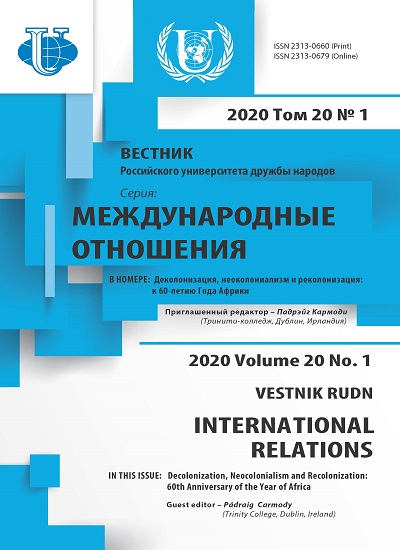Afrocentricity as the Organizing Principle for African Renaissance. Interview with Prof. Molefi Kete Asante, Temple University (USA)
- 作者: Smith A.X.1
-
隶属关系:
- Temple University
- 期: 卷 20, 编号 1 (2020): Decolonization, Neocolonialism and Recolonization: 60th Anniversary of the Year of Africa
- 页面: 210-217
- 栏目: 学派
- URL: https://journals.rudn.ru/international-relations/article/view/23333
- DOI: https://doi.org/10.22363/2313-0660-2020-20-1-210-217
如何引用文章
全文:
详细
Professor Molefi Kete Asante is Professor and Chair of the Department of Africology at Temple University. Asante’s research has focused on the re-centering of African thinking and African people in narratives of historical experiences that provide opportunities for agency. As the most published African American scholars and one of the most prolific and influential writers in the African world, Asante is the leading theorist on Afrocentricity. His numerous works, over 85 books, and hundreds of articles, attest to his singular place in the discipline of African American Studies. His major works, An Afrocentric Manifesto [Asante 2007a], The History of Africa [Asante 2007b], The Afrocentric Idea [Asante 1998], The African Pyramids of Knowledge [Asante 2015], Erasing Racism: The Survival of the American Nation [Asante 2009], As I Run Toward Africa [Asante 2011], Facing South to Africa [Asante 2014], and Revolutionary Pedagogy [Asante 2017], have become rich sources for countless scholars to probe for both theory and content. His recent award as National Communication Association (NCA) Distinguished Scholar placed him in the elite company of the best thinkers in the field of communication. In African Studies he is usually cited as the major proponent of Afrocentricity which the NCA said in its announcing of his Distinguished Scholar award was “a spectacular achievement”. Molefi Kete Asante is interviewed because of his recognized position as the major proponent of Afrocentricity and the most consistent theorist in relationship to creating Africological pathways such as institutes, research centers, departments, journals, conference and workshop programs, and academic mentoring opportunities. Asante has mentored over 100 students, some of whom are among the principal administrators in the field of Africology. Asante is professor of Africology at Temple University and has taught at the University of California, State University of New York, Howard University, Purdue University, Florida State University, as well as held special appointments at the University of South Africa, Zhejiang University in Hangzhou, and Ibadan University in Nigeria.
作者简介
Aaron Smith
Temple University
编辑信件的主要联系方式.
Email: asmith10@temple.edu
PhD in Africology, Assistant Professor - Instructional, Africology and African American Studies, College of Libaral Arts
Philadelphia, USA参考
- Asante, M.K. (1998). The Afrocentric Idea. Philadelphia: Temple University Press.
- Asante, M.K. (2007a). An Afrocentric Manifesto. Cambridge: Polity Press.
- Asante, M.K. (2007b). The History of Africa. New York: Routledge.
- Asante, M.K. (2009). Erasing Racism: The Survival of the American Nation. New York: Prometheus.
- Asante, M.K. (2011). As I Run Toward Africa: A Memoir. New York: Routledge.
- Asante, M.K. (2014). Facing South to Africa: Toward an Afrocentric Critical Orientation. Boulder: Lexington Books.
- Asante, M.K. (2015). African Pyramids of Knowledge. New York: Universal Write Publications.
- Asante, M.K. (2017). Revolutionary Pedagogy. Primer for Teachers of Black Children. New York: Universal Write Publications.
- Asante, M.K. (2020). Radical Insurgencies. New York: Universal Write Publications.
- Asante, M.K. (Eds.). (2013). The Global Intercultural Communication Reader. New York: Routledge.
- Bhabha, H.K. (2004). The Location of Culture. London: Routledge.
- Boaventura, de S.S. (2014). Epistemologies of the South. Justice against Epistemicide. London: Paradigm Publishers.
- Castro-Gomez, S. & Grosfoguel, R. (Eds.). (2007). El giro decolonial: Reflexiones para una diversidad epistémica más allá del capitalismo global. Bogota: Universidad Central.
- Diop, Ch.A. (1989). The African Origin of Civilization: Myth or Reality. Chicago: Lawrence Hill Books.
- Dove, N. (1998). Afrikan Mothers: Bearers of Culture, Makers of Social Change. New York: State University of New York Press.
- Hall, S. (1997). Representation: Cultural Representations and Signifying Practices. London: SAGE Publications.
- Hilliard, A. (1998). African Power: Affirming African Indigenous Socialization in the Face of the Culture Wars. Gainesville: Makare Publishing Company.
- Karenga, M. (1972). Black Cultural Nationalism. In: Addison, G. (Eds.). The Black Aesthetic. New York: Doubleday & Co. P. 31-37.
- Karenga, M. (1997). Kwanzaa: A Celebration of Family, Community and Culture. Los Angeles: University of Sankore Press.
- Karenga, M. (2008). Kawaida and Questions of Life and Struggle: African American, Pan-African, and Global Issues. Los Angeles: University of Sankore Press.
- Kendi, I.X. (2019). How to Be an Antiracist. London: Bodley Head.
- Maldonado-Torres, N. (2012). La descolonización y el giro de(s)colonial. Chiapas: Universidad de la Tierra.
- Mazama, A. (1997). Langue et Identité en Guadeloupe: Une Perspective Afrocentrique. Pointe-à-Pitre: Jasor.
- Mignolo, W.D. (2011). The Darker Side of Western Modernity: Global Futures, Decolonial Options (Latin America Otherwise). London: Duke University press.
- Monteiro-Ferreira, A. (2015). Demise of the Inhuman, The: Afrocentricity, Modernism, and Postmodernism. New York: State University of New York Press.
- Nascimento, do A. (1992). Africans in Brazil: A Pan-African Perspective. Trenton: Africa World Press.
- Ndlovu-Gatsheni, S.J. (2013). Empire, Global Coloniality and African Subjectivity. New York: Berghahn.
- Okafor, V.O. (2017). Towards an Understanding of Africology. Dubuque: Kendall Hunt Pub.
- Said, E.W. (1979). Orientalism. New York: Random House.
- Tillotson, M. (2011). Invisible Jim Crow: Contemporary Ideological Threats to the Internal Security of African Americans. Trenton: Africa World Press.








